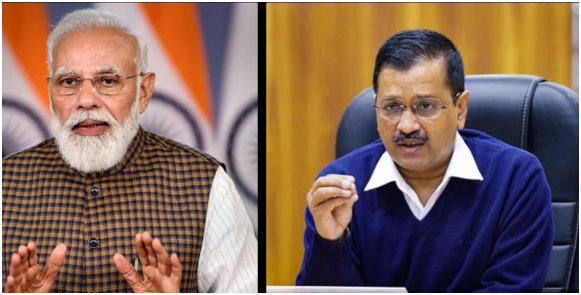AAP Minister’s Comparison of BJP Rule to British Raj Sparks Controversy, Indignation Unleashed
AAP Minister Denounces BJP’s Rule as Resembling British Raj
Amidst a climate of political tension and apprehension, Delhi cabinet minister and Aam Aadmi Party (AAP) leader Saurabh Bharadwaj drew a striking parallel between the rule of the Bharatiya Janata Party (BJP)-led centre and the bygone era of British colonialism. In a press conference held on Tuesday, Bharadwaj evoked imagery of the British Raj, likening the tactics employed by the BJP government to those used by the erstwhile colonial rulers to instill fear and suppress dissent.
Bharadwaj’s remarks were prompted by a series of events, including the recent arrest of Delhi Chief Minister Arvind Kejriwal by the Enforcement Directorate (ED) in a money laundering case. Reflecting on the unprecedented gathering of senior opposition leaders at Delhi’s Ramlila Maidan in support of Kejriwal, Bharadwaj highlighted the intimidation tactics employed by the BJP government to stifle dissent and silence political opposition.

“The scenes witnessed at Ramlila Maidan on March 31st shook the BJP to its core. The sight of India’s most prominent opposition leaders united on one platform was a powerful message,” Bharadwaj stated during the press conference, as reported by news agency ANI. He emphasized the significance of senior opposition figures rallying behind the AAP, whose senior leaders, including Atishi, Durgesh Pathak, and Sandeep Pathak, had been incarcerated.
Expressing concern over the BJP’s aggressive tactics, Bharadwaj underscored the party’s relentless efforts to suppress the AAP by targeting its senior leadership. He emphasized that despite the BJP’s attempts to instill fear through arrests and intimidation, the AAP remains resilient and undeterred in its commitment to serve the people.
Drawing a chilling parallel between the BJP’s approach and the tactics of colonial rulers, Bharadwaj lamented the erosion of democratic values and the rise of authoritarianism under the current government. “Today, the people of the country are gripped by fear, reminiscent of the dark days of British rule when dissent was met with intimidation and imprisonment,” he remarked solemnly.
Bharadwaj’s remarks come at a critical juncture, with his colleague Atishi sounding the alarm over the imminent threat of arrest by the ED. Atishi’s claims, made in the wake of the ED’s naming of herself and Bharadwaj in court proceedings, underscore the mounting pressure faced by AAP leaders in the face of legal and political scrutiny.
The ongoing saga surrounding Kejriwal’s arrest and the subsequent revelations regarding Atishi and Bharadwaj’s alleged involvement in a liquor excise policy case have cast a shadow over the AAP’s political fortunes. With Kejriwal’s judicial custody extended until mid-April, the party finds itself embroiled in a protracted legal battle that threatens to overshadow its electoral aspirations.
As the AAP navigates these turbulent waters, the specter of political persecution and the erosion of democratic norms loom large. Bharadwaj’s impassioned plea for justice and accountability serves as a stark reminder of the need to uphold the principles of democracy and ensure the protection of political rights and freedoms in the face of adversity.
The unfolding events surrounding the AAP leadership’s legal predicament underscore the broader challenges facing India’s democratic fabric. At a time when dissent and political opposition are increasingly met with punitive measures, Bharadwaj’s comparison to the British Raj serves as a poignant reminder of the perils of unchecked authoritarianism.
The arrest of Kejriwal and the looming threat of further arrests targeting AAP leaders not only raise concerns about the erosion of political freedoms but also call into question the impartiality and integrity of India’s judicial system. As Atishi’s claims of imminent ED raids and arrests reverberate through the political landscape, they underscore the urgent need for safeguards to protect the rights of political leaders and ensure the preservation of democratic norms.
For the latest updates-click here.
